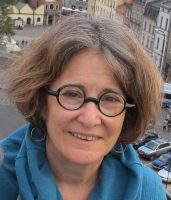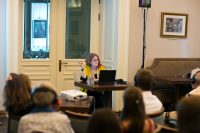
Ruth Ellen Gruber is an American journalist, author, editor and researcher. Her book, Jewish Heritage Travel: A Guide to Eastern Europe, was first published twenty-five years ago and is still considered the most complete Jewish travel guide to the region.
We first learned about Ruth and a bit about her work last year in an episode of Ukrainian Jewish Heritage dealing with dark tourism, which involves travel to places historically associated with death and tragedy.
Ruth’s work however sheds light on Jewish heritage sites with the goal of keeping alive the memory of Jewish life in Europe through the restoration of physical reminders.
Last week we spoke with Ruth Ellen Gruber about her early career as a foreign correspondent in Europe, her run-in with the communist govt in Poland during the time of Solidarity, and her travel guide.
In part 2 of our 2-part interview, we discuss other books, a website she runs that collates information and news about Jewish heritage sites in Europe as well as her work in Ukraine.
Pawlina: So Ruth, you’re American-born but you have roots in Eastern Europe. Where do your ancestors hail from?
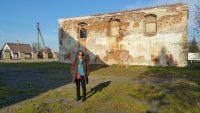
Ruth Ellen Gruber in front of the ruined Great Synagogue in Kalvarija, Lithuania — the town her great-grandparents came from. Photo: Samuel D. Gruber
Ruth: My father’s parents came from a village, and then they moved to a town, which today is in Romania, in the Bukovyna area. When they left it was part of the Austro-Hungarian empire. But today it’s in Romania. My mother’s grandparents came from a village that today is, yes, in Polish lands, but Poland didn’t exist on the map when they left. They left in the 1880s and the town Kalvarija is now the border town in Lithuania with Poland. But Poland did not exist as a state at the time they left.
Pawlina: Right.
Ruth: So both of my mother’s parents were born in the United States. And my father was born in the United States but his parents were born in this area that is now northern Romania.
Pawlina: Okay, so you’re American, for sure.
Ruth: Yes.
Pawlina: So last year you had a lecture in Lviv. That was how we found out about you and connected with you, and did that piece on dark tourism last year. Tell me about your work in Ukraine.
Ruth: My first trip to Ukraine came in 2006 when I was researching the latest edition of Jewish Heritage Travel. I travelled extensively through western Ukraine as far as Kyiv. And Chernitvtsi, but mostly in western Ukraine because that’s where most of the Jewish heritage sites are, the historic ones.
And then in 2008 I was invited to give the keynote talk at a conference organized by what was then the new Centre for Urban History in Lviv. And my talk grew out of a book that I had published in 2002 called Virtually Jewish: Reinventing Jewish Culture in Europe. It’s about the involvement of non-Jewish people with Jewish culture, Jewish heritage, Jewish traditions, etc. After this conference, several of us sat around and discussed what would be the possibilities of rediscovering, or let’s say re-evoking, or bringing to the fore and recapturing the history of Lviv. Because Lviv before the war was roughly one third Jewish, one third Polish and one-third Ukrainian. But the Jews were killed, the Poles sent away and most of the population by now were newcomers who came in from the east. And this history was, you know, it was hidden history in a way. Especially to people who didn’t have their roots there. And we had a long discussion about how to commemorate the Jewish history, what to do. And this led to the design competition for commemorative memorials at three Jewish historical sites in Lviv. The downtown area of the site of the synagogues, the Space of Synagogues; the Yanovsky camp and the one part of the old Jewish cemetery that has not been built over. Most of the cemetery is built over by the Krakivsky Market. But there’s a place by the former Jewish hospital which hasn’t been built over.
Pawlina: Oh dear!
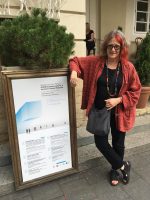 Ruth: So I was on the international jury for this competition. I was back in Lviv at the end of 2010 to choose the winning designs for this, along with other people on the jury. I think there were three of us representing Jewish interests, you know to make sure things accorded with tradition, or Halachic Jewish law, or whatever.
Ruth: So I was on the international jury for this competition. I was back in Lviv at the end of 2010 to choose the winning designs for this, along with other people on the jury. I think there were three of us representing Jewish interests, you know to make sure things accorded with tradition, or Halachic Jewish law, or whatever.
Pawlina: Sure.
Ruth: Since then I’ve been in close contact with the Centre for Jewish History and with other people in Lviv. Then I’ve been back a couple of other times to travel or to give a lecture like I did last summer. I was back for the dedication of the Spaces of Synagogues, which is so far the only one of the three sites where the monuments have been at least almost completed. And I took part in a conference there. Last year I was very happy to be able to travel around for a few days after my lecture to revisit sites, to update and see what’s been going on.
Pawlina: And the information … about the work you do at these sites, the restoration and all that is on your website that you coordinate? Jewish Heritage Europe.
Ruth: Yes. I run the website, Jewish Heritage Europe, which is a project of the Rothschild Foundation (Hanadiv) Europe. I’ve been doing this since 2012. 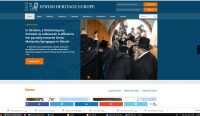 The work I’ve done in Ukraine is on that website. But the work I did prior to this website going online can be found elsewhere. In my book, in the latest edition of Jewish Heritage Europe, where I have a whole chapter on Jewish heritage in Ukraine, and also on a Jewish heritage blog I keep. I wrote articles on my trips and things like that. But I think the latest information is on the Spaces of Synagogues. And there is a video of my lecture last year in Lviv is up online and I think I put it on the Jewish Heritage Europe website.
The work I’ve done in Ukraine is on that website. But the work I did prior to this website going online can be found elsewhere. In my book, in the latest edition of Jewish Heritage Europe, where I have a whole chapter on Jewish heritage in Ukraine, and also on a Jewish heritage blog I keep. I wrote articles on my trips and things like that. But I think the latest information is on the Spaces of Synagogues. And there is a video of my lecture last year in Lviv is up online and I think I put it on the Jewish Heritage Europe website.
Pawlina: Yes, it’s there and it’s on your blog as well. So can you give us the addresses online?
Ruth: The Jewish Heritage Europe website is jewish-heritage-europe.eu. This website is the most comprehensive portal to up-to-date news and information, and insight about Jewish heritage and Jewish heritage issues, in 48 countries. There’s a news feed every other day, sometimes more often, I post articles about what’s happening with projects, or clean-ups, or photo essays about Jewish heritage sites. But there’s also resource information and static information on individual sections for all those 48 countries, as well as photo galleries and things like that.
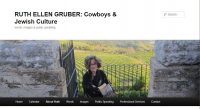
Pawlina: Yes.
Ruth: And then I have a personal website which is Ruth Ellen Gruber dot com. You know people always ask me would there be another edition of the Jewish Heritage Travel Guide. The latest edition came out 11 years ago, in 2007. I basically said no, because things change too fast to keep up. So I started a blog, Jewish-heritage-travel.blogspot.com to try to update what was in that book. I kept it going quite actively for quite some time. Now that blog is somewhat dormant, because I put most of my energy into putting what I would put on that blog, I put on the Jewish Heritage Europe website.
Pawlina: Sure.
Ruth: And you know there’s Facebook pages, and Twitter and all that sort of stuff.
Pawlina: Okay. Well that’s great! Congratulation on this project that turned out just from your curiosity, and starting to chronicle and make a diary of places that you visited some 30 years ago. It’s so illuminating to find out how much was lost.
Ruth: Oh yeah.
Pawlina: I shudder to think, Ruth, what would the world be like now if the Holocaust hadn’t happened.
Ruth: “If” is a big question. Unfortunately, the Holocaust did happen, and in eastern Europe it was followed by repressive regimes which also tried to suppress Jewish culture, Jewish practice, and all of that. In much of the time in communist countries, Jewish culture and Jewish heritage was basically a taboo subject.
Pawlina: Yes.
Ruth: And with the democratic changes that took place in the early 1990s, late 1980s, early 1990s, that really opened up the door to what we all had hoped, and hope still, will be an honest discussion of these issues and what happened, and what can be done. It allowed people to practice their religion freely again. It allowed people like the person whom you mentioned to discover their past, their roots. And to act on it.
Pawlina: Yes.
Ruth: You know I remember in the 1990s in Poland …this is a very common situation in Poland for people to discover that they’re Jewish when they’re adults. That they have Jewish roots. For many people in the 1990s it was a real trauma, because it had been such a sort of taboo thing and the memory and also the reality of anti-Semitism is still basically everywhere, to one degree or another.
Pawlina: Yes, yes.
Ruth: It was a trauma for a lot of people, and in the 1990s in Poland even an SOS hotline was set up for people that can call if they found out that they had Jewish background—what they should do. How to act. There was no internet then. Now it’s a lot easier. You can go online and personally, in the privacy of your home, try to work out certain things. You can also find groups of people on social media and connect. You can connect in ways that were very, very difficult if not impossible even 20 or 25 years ago.
Pawlina: Yes.
Ruth: And there’s a lot of positive things that have happened, but you know there’s a lot of negativity out there still, too.
Pawlina: Sure. Well, thank you so much for your time, for sharing all this information, for the work that you do and continue to do. Thank you so much!
Ruth: Sure, thanks!
Ruth Ellen Gruber, American journalist, writer, editor and researcher now living and working in Europe. She is the author of Jewish Heritage Travel: A Guide to Eastern Europe; Upon The Doorposts of Thy House: Jewish Life in East-Central Europe, Yesterday and Today; and other books. As well she runs the Jewish information portal website Jewish Heritage Europe.
You can follow her and her work there as well as at her personal blog.
Thank you for listening.
Until next time, shalom!
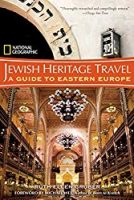 |
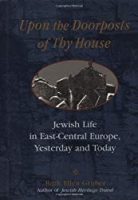 |
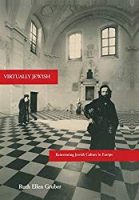 |
|---|
Ukrainian Jewish Heritage is brought to you by The Ukrainian Jewish Encounter based in Toronto, Ontario. To find out more visit their website (here) and follow them on Facebook and Twitter.
![]()
Tune in to the Vancouver edition of Nash Holos Saturdays at 6pm PST on CHMB Vancouver AM1320 or streaming online. As well, the Nanaimo edition airs on Wednesdays from 11am-1pm on air at 101.7FM or online at CHLY Radio Malaspina. As well the International edition airs in over 20 countries on AM, FM, shortwave and satellite radio via PCJ Radio International. (To get the podcast links, click on the Listen tab in the menu bar.) In between broadcasts, please follow @NashHolos on Twitter and Like the Nash Holos Facebook page. I love to hear from you so please send me your suggestions, dedications and requests here. Your comments are always welcome!

